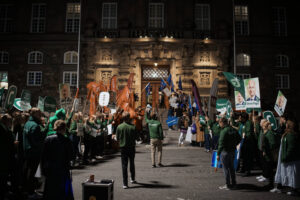Loukas Stamellos reports on the criminal proceedings against the Greek neo-Nazi organization. He is a co-founder of the Greek media collective, OmniaTV.
Translated by Danai Kapranou.

On October 2020, the news that a Greek court had convicted leading members of the neo-fascist Golden Dawn party of running a criminal organization travelled around the world. The trial that ultimately disbanded Greece’s premier neo-Nazi organization, which until 2019 had 18 members seated in the Hellenic Parliament, was initiated in 2014 and lasted five-and-a-half years. It marked the culmination of a process that began after a hit squad linked to the party murdered anti-fascist hip-hop artist Pavlos Fyssas on 18 September 2013.
The ruling was delivered while tens of thousands of people demonstrated outside the Court of Appeals building, anxiously awaiting its decision. The moment it was relayed through a loudspeaker, a combined cry of jubilation rose up from Alexandras Avenue towards the sky above Athens.
Yet this year, Golden Dawn leaders are once again before the Court of Appeals, as both the defence and the prosecution invoked their right to appeal the conviction. Although a verdict is yet to be announced, prospects do not look promising for Greece’s neo-Nazi thugs.
The Resistible Rise of Golden Dawn
Golden Dawn’s ascent out of political marginality began in 2012. At that time, Greece was caught in the throes of a sovereign debt crisis and straining under the austerity policies imposed by the notorious “memorandum of understanding” with the institutions of the European Troika.
Prior to the party’s rise, another far-right party, LAOS, elected 15 MPs after winning 5.63 percent in the 2009 election — the first after the economic crisis began. Two years later, in November 2011, the centrist government led by PASOK’s George Papandreou dissolved, unable to withstand the pressure and political costs of the measures imposed by the Troika. Shortly thereafter, and without holding an election, a coalition government emerged led by the former Governor of the Bank of Greece, Lucas Papademos, and supported by PASOK, the mainstream conservative New Democracy party, and LAOS.
Papademos’s government announced new elections for May 2012. New Democracy, led by Antonis Samaras, emerged victorious with 18.85 percent of the vote on the back of a campaign marked by promises to resist austerity laced with sharp anti-immigrant rhetoric. PASOK lost a large part of its electoral base and ended up in third place with 13.18 percent. Syriza, which up to that point had been an alliance of small parties from the post-Communist Left, advanced to second place with 16.78 percent, while its future coalition partner, the Independent Greeks (ANEL), a right-populist party with certain far-right inclinations, received 10.62 percent and secured 33 MPs.
But the biggest news of that election was the emergence of Golden Dawn as a national force. For the first time, the neo-Nazi party entered parliament with 6.97 percent of the vote and 21 MPs. It would remain there for the next seven years.
The fragmented nature of the election results made it impossible for any party to form a government, and parliament was soon dissolved, with fresh elections scheduled for the following month. This time, New Democracy built on its previous success, and as a result, a new New Democracy-led government emerged with Antonis Samaras as prime minister, supported by PASOK and Dimar, a small, centre-left force that had split from Syriza.
Golden Dawn’s June results were similar to those in May, taking in 6.92 percent, and the party maintained its 18 seats. Its results remained stable in the next elections held in January and September 2015.
Fascist to the Core
Golden Dawn was never just another “far-right” party. From the start, it was a clearly neo-Nazi organization structured according to the National Socialist beliefs and designs of its founder and life-long leader, Nikolaos Michaloliakos. The group took its inspiration from Adolf Hitler’s Nazi Party, and regularly invoked its history and traditions . Even after 2009, when the party began to tone down open displays of the swastika and favour the blue and white of the Greek flag over the traditional red, white, and black of the Nazis, Golden Dawn continued to describe its ideology as “social nationalism”, that is, a contemporary variation of classical National Socialism.
Golden Dawn’s internal structure also mirrored that of the historical Nazis. The smaller local formations are called cells (equivalent to the German Zellen) with a “cell leader” as commander. Directly above them are the local branches (Ortsgruppen) headed by a “secretary”, which are in turn under the authority of the regions (Gaue) headed by one of the Golden Dawn “district leaders”, all of whom were nominated for parliament beginning in 2012.
Golden Dawn also ran an admission and initiation programme for new recruits. Candidates were registered as “probationary members” and went through a period of “ideological indoctrination” that also included training in the organization’s tactics as well as an initiation into the metaphysical ideas of Nazi ideology, drawing heavily on notions of race, historically embodied in the nation and manifested in the figure of the leader. Probationary members graduated from the programme with a closed inauguration ceremony held in the presence of Michaloliakos and other leading functionaries, with speeches, military discipline, and Nazi salutes.
The Golden Dawn “district leaders”, as exemplified by Giannis Lagos, one of the most diligent supervisors of cells and local branches responsible for the district of Piraeus and neighbouring municipalities, organized the cells by selecting cell leaders. They conveyed the ideological and strategic framework of the organization from the leader downwards, and authorized “actions” (including violent assaults) following consultations with him.
Through this model, the organization ensured both efficient control of local teams, while also managing to exempt the supreme leader from responsibility for direct attacks. This came in handy, as it was Michaloliakos’s standard practice to deny the organization’s violent assaults and attribute them to “unknown persons”, or, when members were arrested, to claim that they had acted independently. These structures grew significantly after 2009, when Golden Dawn began to expand into areas where it previously had no presence.
Golden Dawn Goes on the Offensive
Obviously, a faction of the far right, and in fact one with an outright blatantly neo-Nazi ideology and agenda does not simply jump from 0.46 percent in the 2009 European election to nearly 7 percent and 18 MP a few years later. Clearly, some kind of deeper strategy must have been behind its rise. But what, concretely, did it look like?
In fact, Golden Dawn’s surge in publicity began in 2010 with success in the Athens municipal elections. The party’s electoral list won 5.29 percent or 10,222 votes, propelling Nikos Michaloliakos into the city council.
Beginning in 2009, Golden Dawn began implementing a “strategy of tension”, having chosen Athens’s Agios Panteleimonas neighbourhood as the main staging ground for its activity. There, they cooperated with local activists adjacent to New Democracy and LAOS in founding “residents’ committees” targeting migrants in the area. In doing so, the party managed to attract media attention, with its leaders posing as members of the residents’ committees, while at the same time, under the cover of darkness and with the cooperation of local police, they organized attacks on the streets, in shops, or even at migrants’ homes.
The cooperation between Golden Dawn hit squads and the police was not limited to the local level. Even prior to 2012, Golden Dawn members and riot police units cooperating in attacks against left-wing or anarchist protesters had been captured on film numerous times. It is telling that, even after the murder of Pavlos Fyssas and the widespread attention devoted to Golden Dawn’s neo-Nazi orientation, over half of the Greek police force voted for the party in the May 2014 elections.
Golden Dawn’s heightened public profile supplied the organization with a steady stream of new recruits as well as fresh parliamentary funds to deepen its activities. The members of the party’s executive leadership, now elected as MPs, donated a large part of their salaries, while also hiring other Golden Dawn functionaries as parliamentary staff.
The sudden rise of the organization’s activity, combined with its now undisputed dominance of the far-right political camp, gave Michaloliakos and his followers a sense of omnipotence. Golden Dawn attacks increased dramatically after 2012.
In that climate, members of the cell in Perama, a neighbourhood of Athens, decided to attack a house where some Egyptian fishermen lived, knocking one of them, Abuzeid Ebarak, unconscious and leaving him for dead. In January 2013, two Golden Dawn members went “night hunting” with pocket knives and killed the Pakistani worker Shehzad Luqman in the district of Petralona. In September 2013, in a concerted action, the Golden Dawn branches in Nikaia and Perama ambushed Communist Party-affiliated trade unionists, beating them with wooden planks studded with nails. A few days later, the Golden Dawn branch in Nikaia moved in an organized manner to assault and stab Pavlos Fyssas to death for daring to speak out against their presence.
The Prosecution’s Belated Response
The Samaras government, which ruled Greece from 2012 to 2015, cultivated cordial relations with Golden Dawn. Samaras’s aide, Panagiotis Baltakos, regularly spoke with Golden Dawn MPs about bills “of common interest”, such as establishing further obstacles for children of migrants born and raised in Greece to obtain citizenship.
Accordingly, the Greek authorities did not lift a finger against Golden Dawn’s assaults and murders. But after Fyssas, a white Greek man, was murdered, and growing antifascist demonstrations continued to raise political pressure on the government, the prime minister delivered a televised address and the Minister for Citizen Protection, the political head of the police force, pulled 30 briefs listing Golden Dawn attacks out of a drawer and sent them to the state prosecutor. He never explained why this had not happened earlier
The evidence was overwhelming. Nevertheless, the prosecutor in charge, Isidoros Dogiakos, also aligned with New Democracy, did not charge Golden Dawn as a terrorist organization, but instead charged its leading functionaries as members of a criminal organization.
New Democracy actually attempted to change the relevant law in 2014, so that groups could only be charged as criminal organizations if a financial motive was involved — a move that would have automatically annulled the charges against the senior leaders of Golden Dawn. The government ultimately declined to move forward with the change, as it had prompted an uproar even within coalition member PASOK.
The prosecutor’s brief included a huge amount of evidence: terabytes of data containing documents, call metadata, messages, content confiscated from the organization’s computers (internal documents, photos, videos), tapped phone calls (some from the national intelligence service and some from the police), as well as a lot of the material that Golden Dawn itself had been publishing for years on the internet and in its own magazines, confident that it would never face prosecution.
The Trial
The proceedings began on 20 April 2015, with three judges and two substitutes, the prosecutor and her substitute, 68 defendants, over 50 defence attorneys, and 12 lawyers representing the victims to support the prosecution. In total, it took 467 days of court hearings, a process that concluded on 22 October 2020. Over 130 witnesses testified, while an entire year was needed to read, hear, and display the evidence in the courtroom.
The conviction was announced on 7 October 2020. The court found Nikolaos Michaloliakos and six more senior Golden Dawn leaders guilty of “directing the activities of a criminal organization”, and another 43 members of “participating in a criminal organization”. Some of them had taken part in all three assaults against the Communist Party, the Egyptian fishermen, and Fyssas, while others had already been convicted for other assaults in other courtrooms.
According to the court’s reasoning, the most important element leading to the conviction was the identification of the organization’s hierarchical structure as described above and as derived from evidence, the role of the supreme leader and members depending on their position in the hierarchy, and the motivation behind their crimes — namely, their explicitly neo-Nazi ideology.
The Political Fallout and the Appeal
The trial proved devastating for Golden Dawn, but because it was a criminal proceeding targeting specific defendants, rather than a political trial focusing on the party as a whole, Golden Dawn as such could not be outlawed by the court. Besides, Greece lacks a state apparatus capable of banning a political party outright, as the country’s constitution — a product of democratic consensus after the crumbling of the military junta in 1974 — was written at a time when memories of the right-wing Greek state outlawing the Communist Party and other left-wing organizations was still fresh. Nevertheless, the trial sealed Golden Dawn’s delegitimization as a political force in the public eye, decisively weakening one of the oldest and most dangerous neo-fascist organization in the country.
It is worth noting that parts of the state apparatus sought to lighten Golden Dawn’s prosecution and punishment. Fascism, after all, is not a political problem that can be solved by court rulings in criminal cases alone. Nevertheless, the trial provides tools for the antifascist movement that can be used in a wider context.
Now at stake in Golden Dawn’s appeal is whether or not the initial conviction will be confirmed. The witnesses have been called to testify once more, the lawyers supporting the prosecution who fought exhausting battles over the last nine years both before and during the trial, have been called to resume their work for the next three years, if not longer, while the five Court of Appeals judges must re-examine the conviction delivered by their three fellow judges.
Golden Dawn’s appeal begins with the organization in a significantly worse position than 2015: it has broken into three pieces, as the condemned Lagos and Kassidiaris have left Michaloliakos’s party and founded their own groups, Elasyn and Greeks for the Fatherland. Consequently, the defendants do not have a common strategy and often turn on each other.
The imprisoned leaders have all lost their MP status, except for Lagos, who remains a MEP despite currently serving time in prison. That, in turn, means they no longer have access to significant resources from the state budget, and can no longer pay for the armies of lawyers (many of them Golden Dawn members) that defended them in court the first time around.
The mass media, which played a major role Golden Dawn’s rise from 2009 to 2012 by depicting the neo-Nazis as upright citizens and oftentimes even as handsome, patriotic Greeks, have changed their tune under the pressure of the conviction. Their former political supporters and allies keep their distance, if not from all of the condemned, at least from Michaloliakos and those who remain loyal to him.
The prosecutor also lodged an appeal “due to the short sentences” given to those directing the criminal organization, making it more likely that the lawyers supporting the prosecution will achieve the maximum penalty. This cannot be considered unfair for a neo-Nazi terror organization that operated with near-impunity for four decades.







